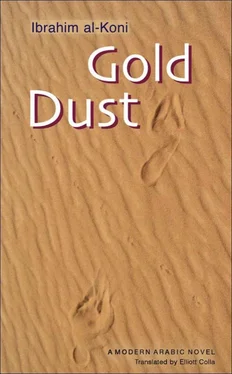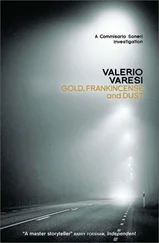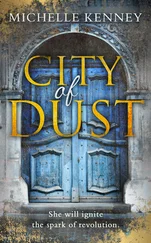Without understanding why, he was sure that if not for the rickety floor, the crumbling palm trunks, and the gloom, he would have been able to locate the invisible being. He tried to force himself to move, but was undone by his helplessness. On the fourth day, though his sleep was no less fitful and broken than it had been before, his nightmares abruptly stopped.
Shame had planted an ache that surpassed all other feeling in his heart. Yet now, the return of the dream filled him with fantastical thoughts of dread. He was terrified by something obscure and this fear had begun to displace his sense of shame. Yet when the dream disappeared on the fourth night, it was the shame that remained.
These were restless days for Ukhayyad. He forgot to drink tea. He forgot to drink water. He had even forgotten the piebald. He spent his hours wandering through the fields, and climbing up and down the mountain until he was overcome by fatigue. Then he would collapse and lie down wherever he happened to be — under a broom or lote tree, in the shade of a rock, or inside a cave, on the summit of the mountain or at its foot. The piebald paced after him, bewildered. While Ukhayyad climbed up mountains, the camel would wait at their foot, in distress.
Who had dared to spread the pernicious rumor that had turned the signs upside down? Who had invented this falsehood? Was it Dudu — or his wretched servants? Was it Ayur, hoping to repay the insult he had shown her when he traded her away for a camel? Or had they all conspired together in the lie? How could they say that he had sold his family for a handful of gold dust? What did gold have to do with it? He had accepted the flecks of metal as a gift, but only at the last moment. He had refused the dust, but the man had insisted. Had his insistence been a ploy? What perplexed Ukhayyad most of all was how quickly the rumor had taken flight — already it had traveled to the farthest reaches of the desert. From time immemorial, it has been said that desert winds carry with them all kinds of rumor and report — especially stories of scandal and outrage. My God — the story told of a shameful deed, the likes of which had never been heard of before in the desert. Even the lowest slave would never sell his wife or child for a handful of gold dust. To hell with the gold — that handful of dirt — he had accepted. The stuff brought nothing but ruin. Ukhayyad had even mentioned how, in his tribe, the yellow copper was considered a curse. And now its curse had caught up with him. It had caught him even though he had not done anything wrong. What they said was libel and slander, but had he inadvertently done something wrong?
He had almost forgotten the promise he made to Tanit. Was Tanit’s pledge behind this — or was it his father’s curse? This was enough to make his head split and his heart explode. Patience now — he needed to be patient. Patience was a form of worship. It was prayer. Patience was life itself. Were the confused thoughts in his head what Sufi sheikhs meant when they talked about the malicious whispering of the Devil? Was this what people called madness?
He had suffered patiently through all kinds of calamity, but how could he withstand something like this with mere patience? It was worse than shame and worse than death. If only he had died! No, it was better to die after he had a chance to make good his mistake. He would have to show people the truth of what had happened. He had sold no person — he had relinquished only his fetters. Of his own will, he had slipped his chains in order to win back his life with the piebald. He had sought salvation — to be free. But who would understand the nonsense he was spouting now? Who would believe these fantastical ideals coming out of his mouth?
In the end, though, he had accepted the gold dust. He had redeemed the pledge of his camel and handed over his wife and child to a foreign man who claimed — perhaps fraudulently — to be her kin.
So easily had he fallen into the trap. No one would believe his story — all the evidence seemed to condemn him. What would he do? He could not go to his death covered in this sort of shame. He would go to the bastard and wrench the truth from his lips. He would force Dudu to tell the truth to all who would listen. And, most of all — he would return the damn gold. Dudu had used it to slander Ukhayyad. The man had dirtied Ukhayyad’s hands and polluted his soul. What now could wash away the stain of that accursed shiny yellow copper? Death might wash away the curse, but how would Ukhayyad wash the insult from people’s minds?
He made up his mind to leave the valley. With a single blow, the rumor had killed the fables of Ukhayyad’s new life. The illusion returned — as shame. The doll came back as child, the noose as wife.
The meaning of everything returned to what it had once been — with a vengeance.
He had no idea how he made the journey, nor how he arrived at the oasis. Nor did he recall how many nights he spent on the road, nor whether he stopped to sleep, or whether he had journeyed day and night without interruption.
Just south of the oasis, in the open space beside the palm groves next to the hut he had once lived in, he spied a group of veiled men tending to slender Mahris. Was this a wedding procession? Had Ukhayyad arrived on the wedding night?
He followed the path that wended around the green thicket of trees. At the entrance, he met a peasant. He asked the man where he could find Dudu. The farmer stuttered and hesitated, standing there in seeming astonishment. Confounded, he finally pointed toward the east and uttered, “You’ll find him over there — at the vineyard spring.”
Ukhayyad led the piebald into the palm groves. The man stood, watching him with bewilderment. What did his look mean? Was he staring at Ukhayyad simply because he had returned to the oasis, or had another rumor gone around that Ukhayyad had died? Had the poor man heard the story of Ukhayyad’s horrible deed — was he stunned to see him show his face again? Or had the man simply noticed something in Ukhayyad’s eyes? Only God knows what goes on in the minds of peasants.
From the west, from beyond the groves, ululations exploded from a distant celebration. Had the wedding begun?
Around the vineyard spring all was silent except for the crickets that began to compete with one another in song.
He heard the noise of water tumbling from the basin of the spring into small channels below. Ukhayyad walked toward it.
The spring was surrounded by a thick ring of date palms, and fig and pomegranate trees. The basin of the spring was round and wide. From its mouth gushed pure, still waters, which then poured over the lip into conduits below. There was only one path that led from this dense copse toward the eastern desert. Through this opening the peaks of sand dunes appeared in the distance.
Ukhayyad turned right. He hoped to approach the spring from the path on the eastern side, he wanted to keep the Mahri close by him. Before he even reached the pool, he saw the man’s loose-fitting robes — they had been thrown over a bramble of palm. As Ukhayyad’s heart raced, the universe seemed to grow increasingly quiet. It seemed that now even the trees were listening to him, thinking, observing and. . waiting. As the silence intensified, the singing of the crickets became more raucous. He heard the sound of water in the spring — the man was taking a bath. The groom was bathing — and getting ready to slip into bed next to his wife. The man had certainly known how to steal her. He had set up Ukhayyad to act as his accomplice — and then he snatched her away. He was the worst kind of bandit — no: bandits steal only camels, but this devil steals other people’s wives! This was unheard of in the desert — and Ukhayyad had been the man’s first victim. But it was worse than this — the thief had then gone and told people that he had bought her, fair and square, with his gold. His slaves were his witnesses — and they would swear to it. They had already sworn to it — Dudu had been confident that people would not talk. He had been sure that people would happily accept his fait accompli. He had come from Aïr to retrieve his kinswoman — his cousin, no less! — and had used his own money to do so. Who could object to such a thing? On the contrary — they would think him a brave man for doing what he did — a hero. And they would believe that Ukhayyad — descendant of the great Akhenukhen, son of the most venerable of the desert tribes — had sold his wife and child for a handful of dirt. To them, he would be a villain stained with shame. And what shame!
Читать дальше












